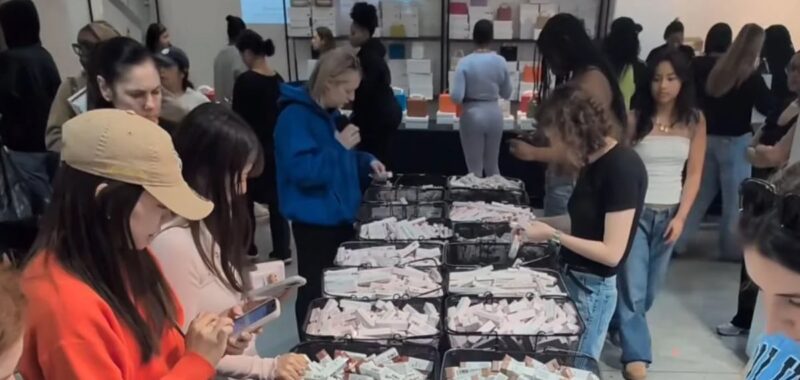
Last week, 260 Sample Sale â the event operator known for its long queues, viral social media buzz and treasure-hunt-style deals â featured a new name on its storefront: Glossier.
The cult beauty brand hosted a multi-day sale at 260âs Lafayette Street location in New Yorkâs SoHo neighbourhood, just two blocks away from Glossierâs flagship store. Customers who caught wind of the event via 260âs social channels could snag Cloud Paint contours for $11, G Suit liquid lipsticks for $9 and Lidstar eyeshadow for just $5 â a steep markdown from their usual retail prices of $22, $24 and $20, respectively.
Chaela Williams, a 26-year-old freelance writer, stopped by the sale to treat herself for her birthday. Williams said sheâd seen Glossier at her hometown TJ Maxx in Pennsylvania for the same discount prices, but âsaying you got it at a sample sale makes it sound more chic.â
Glossier is among a growing number of beauty brands borrowing from fashionâs sample sale model to offload excess or ageing inventory quickly. The short, high-intensity nature of these events creates urgency that drives foot traffic â often with minimal marketing spend. While beauty companies arenât selling pre-production samples, in the way fashion brands often do, they are increasingly using these events to move discontinued SKUs, products from cancelled orders or items nearing expiration â all without diluting brand equity or solely relying on mass discounters.
260 Sample Sale, which was founded in 2003 and operates 11 locations across the US, has previously hosted events for prestige skincare labels Elemis and Dr. Barbara Sturm, multi-category brand names like Bobbi Brown as well as retailers like Space NK.
âWe actually started bringing in a few beauty and skincare vendors about a half a decade ago or so,â said Assaf Azani, 260 Sample Saleâs chief executive. âIt turns out that customers who enjoy high fashion also enjoy fine skin products.â
No-Frills Cheap Thrills
Sample sales offer a short-term, low-commitment alternative to liquidating through discount retailers like TJ Maxx or Marshalls. They also provide a sense of exclusivity and discovery that aligns with the branding of many prestige beauty players. But maintaining that elevated perception â even while selling deeply discounted products â depends on the sample sale consumerâs experience, which will always be determined by the products available, the discount applied and for beauty labels, the ability to touch and feel a lipstick or cream.
Unlike Glossierâs Instagrammable stores or its sleek Sephora aisles staffed with beauty advisors and packed with testers, 260âs beauty sample sale offers a bare-bones setup. Shoppers noted the absence of Glossier signage â only a simple price list â limited testers, and products sorted into large bins by SKU. Additional security measures meant customers had to leave their belongings behind in order to enter, adding to the no-frills, transactional feel of the event.
But for some shoppers, expectations lay not in the store but in the stock.
âThere was absolutely no variety,â said Williams, who was disappointed not to score the brandâs best-selling Boy Brow and Balm Dotcom products âThese were colours and shades that nobody really wanted.â
The author has shared a TikTok.You will need to accept and consent to the use of cookies and similar technologies by our third-party partners (including: YouTube, Instagram or Twitter), in order to view embedded content in this article and others you may visit in future.
Fans are unlikely to find popular âheroâ products at these sales, said a person with knowledge of how brands conduct these sales. âThey may be discontinuing a product, or didnât forecast correctly, or theyâre doing a repack.â
The overrepresentation of eye products at Glossierâs sale â such as Lidstar, Skywash and No. 1 Pencil â may have been due to their shorter shelf life compared to other cosmetics. (The company declined to comment for this article.) A sale for a company undergoing a packaging refresh may be a good place to find a deal on popular products; otherwise, like fashion, it comes down to luck of the draw.
From Sample to Ample
Sample sales create a dilemma for brands, especially those that sell the same products at full price in their own stores. They risk consumers waiting for sales to snag their favourite items, unlike fashion sales, which typically feature end-of-season stock.
However, if executed well, they can be a powerful brand touchpoint, stoking buzz while selling products.
Offloading inventory through a third party allows brands to preserve full-price integrity across their own channels, rather than resorting to frequent markdowns that can devalue a line long-term.
Azani said that 260 Sample Sale schedules its beauty sales closer to gifting seasons before Motherâs Day or Christmas. âWeâve seen high units-per-transaction numbers on these events,â he said, âbecause they end up stocking them for later or to gift for future occasions.â The beauty sales also bring in 20 percent less foot traffic than their fashion sales.
But presentation matters. In lieu of being able to open up the products and try them on, as one would during a fashion sample sale, brands that invest in on-site advisors, who can counsel shoppers on their offerings can drive sales. Additionally, recognisable branding and event-specific gifting can generate social media buzz. Those extras though cost more than what lines might want to spend.
Itâs also an opportunity to win over new customers who may have originally come to shop at a neighbouring fashion sale â many of which share the same floor at 260 Sample Sale, said Azani. Done right, these events can also re-engage lapsed customers or appeal to existing fans for whom the full entry price may be a barrier.
âThereâs always a goal to try and move as much inventory as possible,â said Azani. âBut of course, I think establishing a relationship with a new customer is always just as equally as important.â
Sign up to The Business of Beauty newsletter, your must-read source for the dayâs most important beauty and wellness news and analysis.

